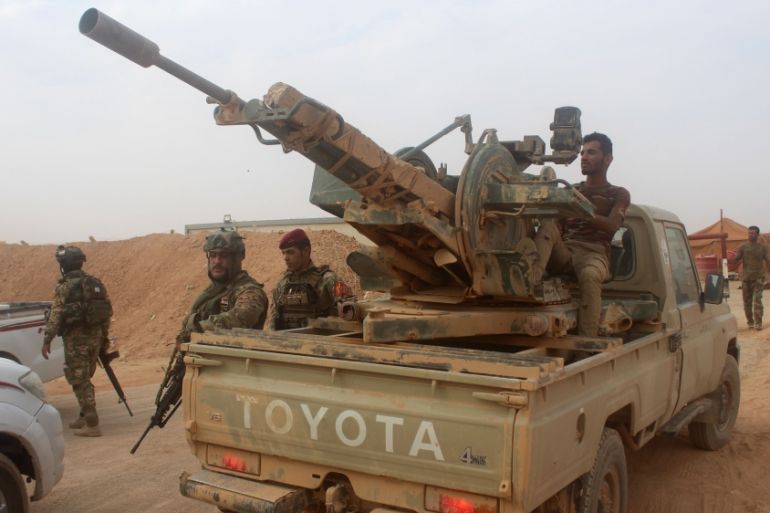Iraq’s army regains ISIL area on Syrian border
Iraqi military says Akashat, a desert region located south of the Euphrates river, was captured from armed group.

Iraqi armed forces have dislodged Islamic State of Iraq and the Levant (ISIL, also known as ISIS) from a natural gas-rich border area with Syria, according to the military.
An Iraqi military statement said on Saturday Akashat, a desert region located south of the Euphrates river, was captured in an offensive which had been announced earlier in the day.
Keep reading
list of 4 itemsMoscow theatre attack suspects show signs of beating in court
Four men showing signs of severe beating charged over Moscow concert attack
Russia mourns Moscow concert hall attack victims as death toll rises to 137
READ MORE: Assad forces advance against ISIL in central Syria
The attack on Akashat is meant to pave the way for the recapture of urban centres in the Euphrates valley, including the border post of al-Qaim, it said.
Iranian-backed Shia paramilitary forces known as Popular Mobilisation and Sunni tribal fighters known as Tribal Mobilisation took part in the offensive, it added.
The Iraqi air force dropped thousands of leaflets overnight on Akashat as well as on al-Qaim and the towns of Ana and Rawa, alongside the Euphrates, telling ISIL fighters to surrender or face death, the statement said.
Pro-Assad forces launch offensive
Meanwhile in Syria, an alliance of Shia fighters fighting with the Syrian army said it launched an assault to reach al-Bukamal, the Syrian border town on the Euphrates, facing al-Qaim.
Securing al-Bukamal is important for Iran’s allies as the two other main crossings into Syria, to the north and to the south, are under the control of forces allied with the US.
Securing a land corridor across Iraq could make it easier for Iran to ferry heavy weapons to Syria should Baghdad approve such transfers. The Shia-led Iraqi government in Baghdad has good relations with both Tehran and Washington.
READ MORE: Syria diplomatic talks – A timeline
The Russian and US-backed campaigns against ISIL in Syria have mostly stayed out of each other’s way as the sides seek to avoid conflict, with the Euphrates often acting as a dividing line between them.
The cross-border “caliphate” declared by ISIL in 2014 in effect collapsed in July, when a US-backed Iraqi offensive captured Mosul, the ISIL’s self-styled capital in Iraq.
The towns in the border region with Syria and Hawija, a northern province close to the oil-rich city of Kirkuk, are the only urban centres still under ISIL control in Iraq.
The group overran about a third of Iraq in 2014 in a sweeping offensive that allowed the fighters to grab hundreds of millions of dollars worth of weaponry and vehicles left by the fleeing Iraqi forces.